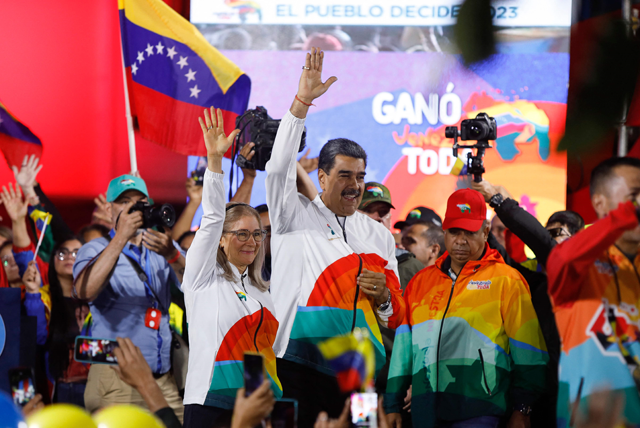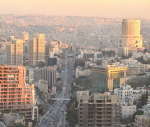You are here
Top Venezuela, Guyana diplomats meet on Essequibo border dispute
By AFP - Jan 26,2024 - Last updated at Jan 26,2024

Brazil’s Foreign Minister Mauro Vieira (centre) meets with Guyana’s Foreign Minister Hugh Todd (out of frame) and Venezuela’s Foreign Minister Yvan Gil (out of frame) to discuss the crisis about the territory of Essequibo which has long pitted their two countries, at the Itamaraty Palace in Brasilia, Brazil, on Thursday (AFP photo)
BRASÍLIA — The foreign ministers of Guyana and Venezuela met on Thursday in Brazil’s capital city to discuss the simmering crisis on their border over a disputed oil-rich region.
Guyanese Foreign Minister Hugh Hilton Todd and Venezuelan counterpart Yvan Gil met in Brasilia for the first high-level talks on the disputed Essequibo region since their respective presidents held a crisis summit in Saint Vincent and the Grenadines last month.
Neither diplomat made statements as they arrived at Brazil’s foreign ministry headquarters for the meeting, which was also attended by their Brazilian counterpart Mauro Vieira.
With both sides holding firm, observers do not expect a major breakthrough on Venezuela’s claim to Essequibo, which makes up about two-thirds of Guyanese territory.
The crisis has triggered international concern over a potential military conflict in relatively peaceful South America, though Presidents Irfaan Ali and Nicolas Maduro agreed at their meeting on December 14 not to resort to force.
Essequibo has been administered by Guyana for more than a century and is the subject of border litigation before the International Court of Justice (ICJ) in The Hague — whose jurisdiction in the matter Venezuela rejects.
The region is home to 125,000 of Guyana’s 800,000 citizens, but Caracas has long claimed the region should be under its control.
The row was revived in 2015 as US energy giant ExxonMobil discovered huge crude reserves in Essequibo and reached fever pitch last year after Georgetown started auctioning off oil blocks in the region.
Maduro’s government then called a controversial, non-binding referendum that overwhelmingly approved the creation of a Venezuelan province in Essequibo, according to official results.
That sparked fears of a military conflict.
‘We believe in diplomacy’
Ivan Rojas, a Venezuelan international relations professor, told AFP no solution is expected to emerge from Thursday’s meeting.
“It is likely they will simply focus on mutual assurances and keeping the peace.”
The dispute escalated dramatically last month when the US held joint military exercises with Guyana and Britain sent a warship to Guyanese waters. Venezuela launched a “defensive” military deployment in response.
On Wednesday, Guyana said it remained “fully committed” to the agreement struck with its neighbour in December, “in particular the maintenance of peace”.
President Ali told AFP in Georgetown that the meeting was an important step towards fulfilling the December agreement, which foresees the creation of a commission “to look at all the consequential matters”.
The ministers would also seek to set up another presidential meeting.
“It gives us now the opportunity to outline the agenda with items that both sides would want to speak on... issues of trade, climate, energy security, initiatives to expand our trade,” the president said.
Venezuela’s Gil described the dialogue as a “success for diplomacy”.
On his arrival in Brasilia, he told state broadcaster VTV the meeting “removes any possibility of conflict beyond the territorial controversy we have”.
For his part, Maduro said last month: “We believe in diplomacy, dialogue and peace.”
Brazil, which borders both countries and is acting as mediator, welcomed the “engagement of Guyana and Venezuela in the ongoing dialogue process” in a statement announcing Thursday’s meeting.
Venezuela claims Essequibo has historically been considered part of its territory since 1777, when it was part of the Spanish empire, with the Essequibo River forming a natural boundary.
However, Guyana, a former British and Dutch colony, says the border was ratified in 1899 by an arbitration court in Paris.
Related Articles
CARACAS — The presidents of Venezuela and Guyana met on Thursday in the Caribbean for talks that analysts say could "de-escalate" tensions b
CARACAS — A British warship arrived off the coast of Guyana on Friday, further fuelling tensions over a territorial dispute with Venezuela,
CARACAS — Venezuelan electoral authorities on Sunday claimed that 95 per cent of voters in a nonbinding referendum approved of the nation’s


















